Tomado de http://liberaciontotal.lahaine.org/?p=4838
Ataque incendiario a casa patronal de empresario agricola y ajusticiamiento de Werner Luchsinger y Vivianne McKay en La Araucanía
04.Ene.13
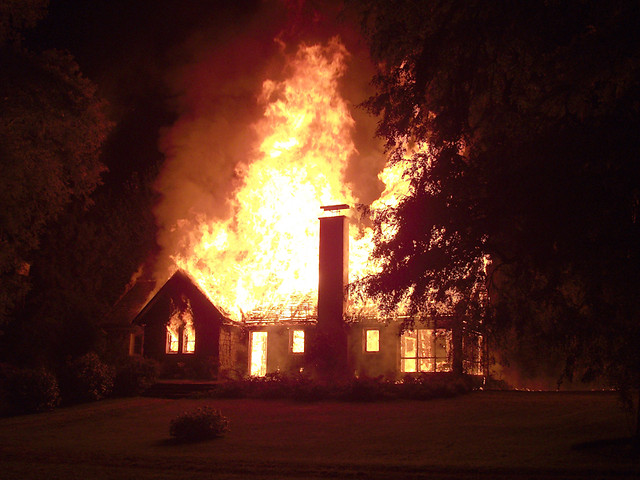
desde la prensa…
Un atentado incendiario se registró la madrugada de este viernes 4/1 en la comuna de Vilcún, a 25 kilómetros de la capital de la región de La Araucanía.
Unxs 20 encapuchadxs llegaron al fundo Palihue, propiedad del empresario y latifundista Werner Luchsinger Lemp, prendiéndole fuego a la casa patronal que resultó completamente destruida.
Al lugar llegaron bomberos para controlar el siniestro, junto con policias, descubriéndo dos cuerpos calcinados.
Al principio la policía y el fiscal evitaron confirmar si ambos cadáveres correspondían a Luchsinger y a su esposa Vivianne McKay, quienes habían sido dados por desaparecidos. Pero luego el Ministerio Público confirmó que los muertos corresponden al empresario y su cónyuge, ambos adultos mayores, cuyos restos fueron derivados hasta el Servicio Médico Legal, para ser periciados y establecer la causa de muerte.
Durante el ataque el latifundista habría disparado desde el segundo piso e hirió a uno de lxs encapuchadxs, que luego fue detenido por carabineros en las cercanías, siendo derivado hasta el Hospital Regional de Temuco, debido a que presentaba una herida de proyectil en la altura del pecho. Este hombre será formalizado luego de ser atentido en el hospital.
El fundo Palihue no contaba con protección policial, debido a que no era reclamado por alguna comunidad mapuche de la zona.
Junto a la casona destruída, se habrían encontrado panfletos haciendo alusión a las reivindicaciones mapuche y por la muerte de Matías Catrileo, uno de los 13 indígenas muertos desde que en la década de 1990 se reactivaran sus reivindicaciones de tierras.
Recordar que Matías fue asesinado a balazos por la espalda a manos del sargento Walter Ramírez, este hecho ocurrió el 3 de Enero de 2008 durante una toma de terreno en el fundo Santa Margarita, propiedad de Jorge Luchsinger, primo hermano del empresario que fue ajusticiado en este ultimo atentado.
Durante los últimos días, en Temuco aparecieron rayados precisamente contra la familia Luchsinger y a favor de la causa mapuche, recordado la muerte de Matías Catrileo.
Hasta el momento ningún grupo guerrillero mapuche ha reivindicado el ataque incendiario y el ajusticiamiento de los latifundistas.
Las reacciones de parte del Poder y del Estado no se han hecho esperar, mientras la policía realiza violentos y desenfrenados allanamientos a comunidades mapuche. Esto porque la familia Luchsinger es bien conocida y amiga de todos los poderosos de este país, es de esperar que esten sedientos de venganza contra todxs lxs mapuche.

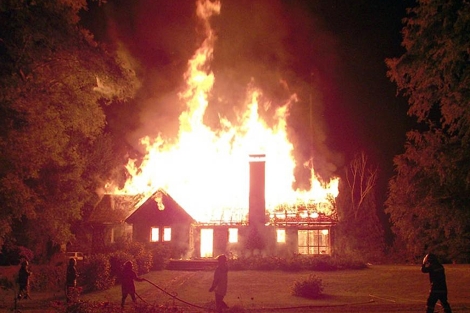


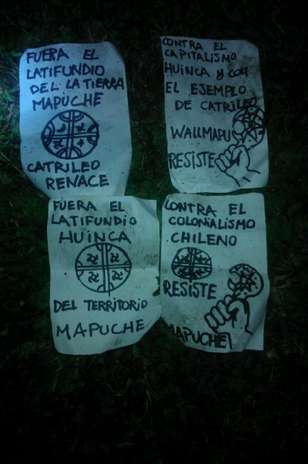
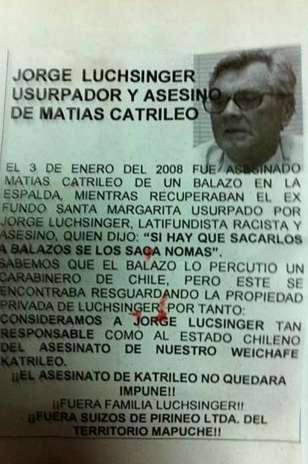

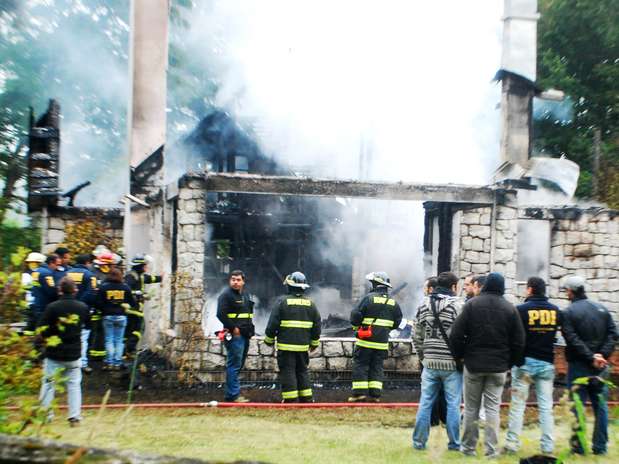
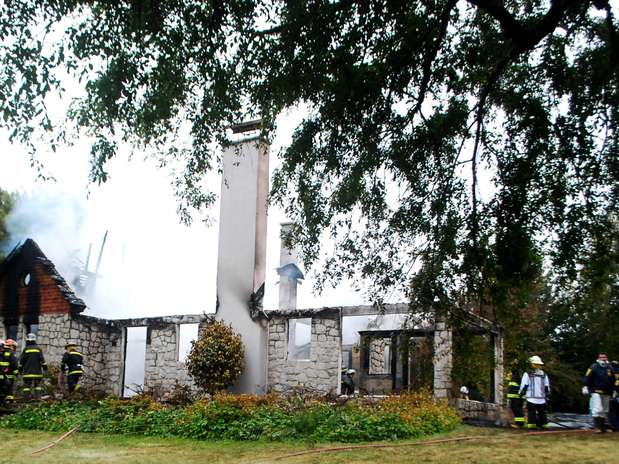
Un atentado incendiario se registró la madrugada de este viernes 4/1 en la comuna de Vilcún, a 25 kilómetros de la capital de la región de La Araucanía.
Unxs 20 encapuchadxs llegaron al fundo Palihue, propiedad del empresario y latifundista Werner Luchsinger Lemp, prendiéndole fuego a la casa patronal que resultó completamente destruida.
Al lugar llegaron bomberos para controlar el siniestro, junto con policias, descubriéndo dos cuerpos calcinados.
Al principio la policía y el fiscal evitaron confirmar si ambos cadáveres correspondían a Luchsinger y a su esposa Vivianne McKay, quienes habían sido dados por desaparecidos. Pero luego el Ministerio Público confirmó que los muertos corresponden al empresario y su cónyuge, ambos adultos mayores, cuyos restos fueron derivados hasta el Servicio Médico Legal, para ser periciados y establecer la causa de muerte.
Durante el ataque el latifundista habría disparado desde el segundo piso e hirió a uno de lxs encapuchadxs, que luego fue detenido por carabineros en las cercanías, siendo derivado hasta el Hospital Regional de Temuco, debido a que presentaba una herida de proyectil en la altura del pecho. Este hombre será formalizado luego de ser atentido en el hospital.
El fundo Palihue no contaba con protección policial, debido a que no era reclamado por alguna comunidad mapuche de la zona.
Junto a la casona destruída, se habrían encontrado panfletos haciendo alusión a las reivindicaciones mapuche y por la muerte de Matías Catrileo, uno de los 13 indígenas muertos desde que en la década de 1990 se reactivaran sus reivindicaciones de tierras.
Recordar que Matías fue asesinado a balazos por la espalda a manos del sargento Walter Ramírez, este hecho ocurrió el 3 de Enero de 2008 durante una toma de terreno en el fundo Santa Margarita, propiedad de Jorge Luchsinger, primo hermano del empresario que fue ajusticiado en este ultimo atentado.
Durante los últimos días, en Temuco aparecieron rayados precisamente contra la familia Luchsinger y a favor de la causa mapuche, recordado la muerte de Matías Catrileo.
Hasta el momento ningún grupo guerrillero mapuche ha reivindicado el ataque incendiario y el ajusticiamiento de los latifundistas.
Las reacciones de parte del Poder y del Estado no se han hecho esperar, mientras la policía realiza violentos y desenfrenados allanamientos a comunidades mapuche. Esto porque la familia Luchsinger es bien conocida y amiga de todos los poderosos de este país, es de esperar que esten sedientos de venganza contra todxs lxs mapuche.









CONTEXTO
Chile: "terrorist" attacks in Mapuche region
Tomado de http://ww4report.com/node/11883
Submitted by Weekly News Update... on Tue, 01/15/2013 - 11:40
Chilean landowner Werner Luchsinger and his wife, Vivianne McKay, died in a fire set by some 20 masked attackers on Jan. 4 at their Lumahue estate in Vilcún, in the southern region of Araucanía. Luchsinger, who was 75 years old, reportedly fought back against the intruders with a firearm, wounding at least one.
The couple, who owned some 1,000 hectares of farmland in the region, had resisted demands for land from the indigenous Mapuche community. Pamphlets were found at the site commemorating the fifth anniversary of the death of Mapuche student Matías Catrileo Quezada, who was shot in the back by a police agent on Jan. 3, 2008 during an occupation of an estate owned by Werner Luchsinger's cousin, Jorge Luchsinger.
Right-wing president Sebastián Piñera reacted immediately to the killings with an unscheduled trip to the Araucanía, announcing that he would send a contingent of the carabineros militarized police to reinforce the carabineros already in the region and that he would appoint a special prosecutor for the case. The attackers would be prosecuted under a controversial "antiterrorist" law from the 1973-1990 dictatorship of Gen. Augusto Pinochet, he said. "This struggle isn't against any group in particular, much less against the Mapuche people," Piñera said. "It's a struggle against a minority of criminals, of terrorists and violent people who feel they have the right to go beyond the law."
Government officials indicated that the attackers were funded by foreign forces. "We're in the presence of an organized terrorist group, with terrorist methods, with international links that come with training, with training sessions and contacts with the FARC," General Secretary of the Presidency Cristian Larroulet said on Jan. 8, referring to the rebel Revolutionary Armed Forces of Colombia. Chilean prosecutors have been trying since 2010 to establish a link between the FARC and militant Mapuche organizations, with a focus on the Arauco Malleco Coordinating Committee (CAM). (A declaration by the CAM published on Jan. 8 denounced the recent violence as "erratic actions committed by some groups not connected to our organization…actions [that] only serve the interests of businesses and the government.")
As of Jan. 10 Chilean authorities had arrested three people in the deaths at the Luchsinger estate. Celestino Córdova Tránsito, a machi (doctor in traditional Mapuche medicine), was found with a bullet wound near the estate on the day of the attack. His brother, José Córdova Tránsito, was detained on Jan. 9 in the community of Lleupeco (or Yeupeko). Carlos Huerao Carril was arrested when a large number of carabineros and investigations police agents carried out a violent early morning raid in Lleupeco on Jan. 10. A shotgun and a pistol were found in Huerao's home; his wife said the weapons were licensed. Celestino Córdova was indicted on Jan. 11 on four charges, including "terrorist" homicide and arson. José Córdova was released on Jan. 12 after being charged with illegal possession of a firearm and ammunition; he was not charged under the antiterrorism law.
Violent incidents continued in Araucanía, despite tightened security and the presence of 400 carabineros. A shed with machinery inside was set on fire in the early morning of Jan. 5 at the commune of Freire, and two lumber trucks were burned in a separate incident the same morning in the Capitán Pastene sector; there were no injuries in either attack. Another fire was set in a storeroom and an uninhabited house in Padre las Casas on Jan. 8. On Jan. 10 three armed and masked men torched the house of the caretaker of the estate of business owner Joaquín Biwer Meller in Río Bueno municipality in the Los Ríos region, which is directly south of Araucanía; Mapuche activists had tried to occupy this estate in 2009.
Also on Jan. 10, a fire was set in a storeroom at the Trapilhue private school in the Maquehue sector of Araucanía, near Temuco, the regional capital. According to the police, there were no witnesses to the incident but graffiti were found supporting the Mapuche cause and opposing a new airport being built nearby. The school has 90 pupils, 87 of them Mapuches. The arson "constitutes a clumsy effort to link the Mapuche communities in resistance to criminal acts," unnamed local leaders told the Venezuela television network TeleSUR.
Chile's 700,000 Mapuches form the largest indigenous group in the country. Their lands, largely in the Araucanía, were taken over in 1883 by the government, which offered them to European settlers; the Luchsingers are descended from Swiss immigrants who arrived some 90 years ago. Since the 1990s Mapuche groups have been demanding the return of the lands they claim, which are now mostly under the control of large landowners and timber companies. Successive governments have responded to Mapuche activism with repression; as many as 13 Mapuche activists have died in the recent struggles over land.
During the past year the Piñera administration has created a development zone in the region which it says has benefited 1,000 families, members of 37 of the 42 Mapuche communities, but at the same time the government continues to apply repression, as in the current application of the Pinochet-era laws.
Mapuche leaders deny that their activists have links to outside forces. "The Mapuches don't need the FARC to sustain their legitimate struggle for the recovery of their territory," the werkén (spokesperson) Aucán Huilcamán of Consejo de Todas las Tierras (Council of All Lands) told reporters. "The government shouldn't insist on repressive measures; it should open up a solid, long-term dialogue." (La Jornada, Mexico, Jan. 5, from DPA, AFP, Jan. 6, from AFP, Jan. 8, from AFP, Notimex, DPA, Jan. 9 from DPA, AFP; Inter Press Service, Jan. 8, via Upside Down World; Fortín Mapocho, Chile, Jan. 8; EFE, Jan. 10, via Terra.com; TeleSUR, Jan. 11; MapuExpress, Chile, Jan. 11, Jan. 14; Werkén, Chile, Jan. 12)
On Jan. 11 a group of Mapuche researchers and academics published an open letter on the Luchsinger killings. "[D]eaths resulting from a conflict are always regrettable," they wrote, and "contribute to radicalization and polarization of the political and ideological positions and lead to the development of irrational acts." At the same time, the signers called for an understanding of "the historical background that underlies the contradictions and present conflicts. Violence is never an arbitrary phenomenon."
"We don't want the events in Vilcún to be a justification for the Chilean state to add new victims to the list of numerous Mapuches who already have been assassinated over the course of this long conflict." (Declaración pública de investigadores mapuche sobre acontecimientos recientes en La Araucanía, Jan. 11)
The couple, who owned some 1,000 hectares of farmland in the region, had resisted demands for land from the indigenous Mapuche community. Pamphlets were found at the site commemorating the fifth anniversary of the death of Mapuche student Matías Catrileo Quezada, who was shot in the back by a police agent on Jan. 3, 2008 during an occupation of an estate owned by Werner Luchsinger's cousin, Jorge Luchsinger.
Right-wing president Sebastián Piñera reacted immediately to the killings with an unscheduled trip to the Araucanía, announcing that he would send a contingent of the carabineros militarized police to reinforce the carabineros already in the region and that he would appoint a special prosecutor for the case. The attackers would be prosecuted under a controversial "antiterrorist" law from the 1973-1990 dictatorship of Gen. Augusto Pinochet, he said. "This struggle isn't against any group in particular, much less against the Mapuche people," Piñera said. "It's a struggle against a minority of criminals, of terrorists and violent people who feel they have the right to go beyond the law."
Government officials indicated that the attackers were funded by foreign forces. "We're in the presence of an organized terrorist group, with terrorist methods, with international links that come with training, with training sessions and contacts with the FARC," General Secretary of the Presidency Cristian Larroulet said on Jan. 8, referring to the rebel Revolutionary Armed Forces of Colombia. Chilean prosecutors have been trying since 2010 to establish a link between the FARC and militant Mapuche organizations, with a focus on the Arauco Malleco Coordinating Committee (CAM). (A declaration by the CAM published on Jan. 8 denounced the recent violence as "erratic actions committed by some groups not connected to our organization…actions [that] only serve the interests of businesses and the government.")
As of Jan. 10 Chilean authorities had arrested three people in the deaths at the Luchsinger estate. Celestino Córdova Tránsito, a machi (doctor in traditional Mapuche medicine), was found with a bullet wound near the estate on the day of the attack. His brother, José Córdova Tránsito, was detained on Jan. 9 in the community of Lleupeco (or Yeupeko). Carlos Huerao Carril was arrested when a large number of carabineros and investigations police agents carried out a violent early morning raid in Lleupeco on Jan. 10. A shotgun and a pistol were found in Huerao's home; his wife said the weapons were licensed. Celestino Córdova was indicted on Jan. 11 on four charges, including "terrorist" homicide and arson. José Córdova was released on Jan. 12 after being charged with illegal possession of a firearm and ammunition; he was not charged under the antiterrorism law.
Violent incidents continued in Araucanía, despite tightened security and the presence of 400 carabineros. A shed with machinery inside was set on fire in the early morning of Jan. 5 at the commune of Freire, and two lumber trucks were burned in a separate incident the same morning in the Capitán Pastene sector; there were no injuries in either attack. Another fire was set in a storeroom and an uninhabited house in Padre las Casas on Jan. 8. On Jan. 10 three armed and masked men torched the house of the caretaker of the estate of business owner Joaquín Biwer Meller in Río Bueno municipality in the Los Ríos region, which is directly south of Araucanía; Mapuche activists had tried to occupy this estate in 2009.
Also on Jan. 10, a fire was set in a storeroom at the Trapilhue private school in the Maquehue sector of Araucanía, near Temuco, the regional capital. According to the police, there were no witnesses to the incident but graffiti were found supporting the Mapuche cause and opposing a new airport being built nearby. The school has 90 pupils, 87 of them Mapuches. The arson "constitutes a clumsy effort to link the Mapuche communities in resistance to criminal acts," unnamed local leaders told the Venezuela television network TeleSUR.
Chile's 700,000 Mapuches form the largest indigenous group in the country. Their lands, largely in the Araucanía, were taken over in 1883 by the government, which offered them to European settlers; the Luchsingers are descended from Swiss immigrants who arrived some 90 years ago. Since the 1990s Mapuche groups have been demanding the return of the lands they claim, which are now mostly under the control of large landowners and timber companies. Successive governments have responded to Mapuche activism with repression; as many as 13 Mapuche activists have died in the recent struggles over land.
During the past year the Piñera administration has created a development zone in the region which it says has benefited 1,000 families, members of 37 of the 42 Mapuche communities, but at the same time the government continues to apply repression, as in the current application of the Pinochet-era laws.
Mapuche leaders deny that their activists have links to outside forces. "The Mapuches don't need the FARC to sustain their legitimate struggle for the recovery of their territory," the werkén (spokesperson) Aucán Huilcamán of Consejo de Todas las Tierras (Council of All Lands) told reporters. "The government shouldn't insist on repressive measures; it should open up a solid, long-term dialogue." (La Jornada, Mexico, Jan. 5, from DPA, AFP, Jan. 6, from AFP, Jan. 8, from AFP, Notimex, DPA, Jan. 9 from DPA, AFP; Inter Press Service, Jan. 8, via Upside Down World; Fortín Mapocho, Chile, Jan. 8; EFE, Jan. 10, via Terra.com; TeleSUR, Jan. 11; MapuExpress, Chile, Jan. 11, Jan. 14; Werkén, Chile, Jan. 12)
On Jan. 11 a group of Mapuche researchers and academics published an open letter on the Luchsinger killings. "[D]eaths resulting from a conflict are always regrettable," they wrote, and "contribute to radicalization and polarization of the political and ideological positions and lead to the development of irrational acts." At the same time, the signers called for an understanding of "the historical background that underlies the contradictions and present conflicts. Violence is never an arbitrary phenomenon."
"We don't want the events in Vilcún to be a justification for the Chilean state to add new victims to the list of numerous Mapuches who already have been assassinated over the course of this long conflict." (Declaración pública de investigadores mapuche sobre acontecimientos recientes en La Araucanía, Jan. 11)





No hay comentarios:
Publicar un comentario